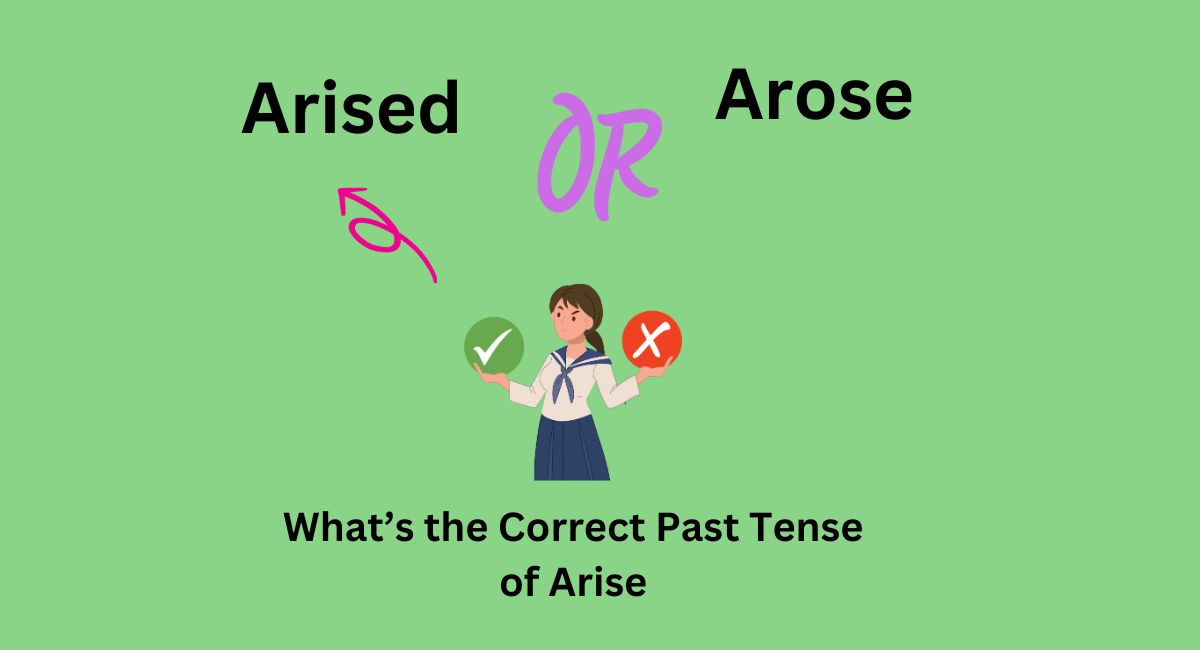When we talk about the past tense of “arise”, it can be confusing for many people. Some might think the past tense is “arised”, but that is not correct. The right past tense form of “arise” is “arose”. Understanding this rule helps in using the verb properly in sentences.
“Arise” is an irregular verb. Unlike regular verbs, it does not follow the usual rule of adding “-ed” to form the past tense. The correct form is “arose”. Using the right verb form makes writing and speaking in English grammar clearer and more accurate, avoiding common mistakes.
Why is There Confusion?
Many people get confused about the past tense of “arise” because of the regular rules for most verbs. In English, most verbs change to the past tense by adding “-ed”, like “walk” becoming “walked.” People expect “arise” to follow this rule which causes mistakes. However, “arise” is an irregular verb.
The main problem is that irregular verbs don’t follow the usual pattern. For example, the correct past tense of “arise” is “arose”. Many people mistakenly use “arised” because they think it should follow the regular verb rule. It’s important to know the correct form to use in writing and speech.
The confusion about the past tense of “arise” happens because many people think verbs just add “-ed” to form the past tense. However, “arise” is an irregular verb. It doesn’t follow the usual rule, so the correct form is “arose”.
What Does the Word “Arise” Mean?
The word “arise” means to come into existence or to appear. It is an intransitive verb, meaning it does not need a direct object. People get confused because most verbs form the past tense by adding “-ed”, like “walked.” But “arise” is an irregular verb, so its past tense is “arose”.
Intransitive verbs can cause confusion because they do not need a direct object to complete their meaning. Many people expect verbs to follow the usual rule of adding -ed for the past tense. However, irregular verbs, like “arise,” don’t follow this pattern, which leads to mistakes in usage.
The Past Tense of “Arise”
- Correct Past Tense Form: The past tense of “arise” is “arose”. This is the form used when talking about something that happened in the past.
- Irregular Verb: “Arise” is an irregular verb, which means it does not follow the usual rule of adding “-ed” to make the past tense.
- Avoid the Mistake of “Arised”: Some people mistakenly say “arised”. This is not correct. The right form is “arose”.
- Examples of “Arose”: Here are some examples: “A new problem arose yesterday.” “A good idea arose during the meeting.”
Why It Is Not “Arised”?
The past tense of “arise” is “arose”, not “arised”. “Arise” is an irregular verb, which means it doesn’t follow the usual rule of adding “-ed” to form the past tense. Using “arised” is wrong because it doesn’t fit the grammar rules for irregular verbs.
Pronunciation “Arise” and “Arose”
The pronunciation of “arise” is /əˈraɪz/, with emphasis on the second syllable. It rhymes with “wise.” This word is often used when something comes up or begins. For example, “Problems can arise during a meeting.”
The word “arose” is pronounced /əˈroʊz/, also with emphasis on the second syllable. It rhymes with “rose.” It is used to show that something happened in the past, like “A challenge arose during the event.”
A Simple Table Showing the Present, Past, and Future Tense of the Verb “Arise”
| Tense | Example Sentence | Description |
|---|---|---|
| Present | I arise early every day. | Action happening right now. |
| Present Continuous | I am arising from bed. | Action happening right now and continuing. |
| Present Perfect | I have arisen from my seat. | Action completed recently. |
| Past | A problem arose during the meeting. | Action that happened in the past. |
| Past Continuous | I was arising when you called. | Action happening in the past. |
| Past Perfect | I had arisen before the alarm went off. | Action completed before another past action. |
| Future | I will arise at 6 AM tomorrow. | Action that will happen in the future. |
| Future Continuous | I will be arising when you arrive. | Action happening in the future. |
| Future Perfect | I will have arisen by the time you arrive. | Action completed before a future time. |
Examples of “Arise” and “Arose” in Sentences
Examples of “Arise” and “Arose” in Sentences show how these words are used in different situations. “Arise” talks about something happening now, like “Problems often arise during meetings,” while “Arose” is used for past events, such as “A problem arose last week.”
Present Tense (“Arise”):
- Problems often arise when people do not communicate clearly.
- Conflicts arise between team members when they have different goals.
- Opportunities can arise when you face new challenges.
- New questions arise during discussions in meetings.
- Difficulties often arise when people do not follow the rules.
Past Tense (“Arose”):
- The past tense of “arise” is “arose.”
- Use “arose” to talk about something that happened in the past.
- For example, you might say, “A problem arose during the meeting.”
- “Arose” is an irregular verb, so it doesn’t follow the regular pattern of adding -ed.
- Remember, “arose” is used only for things that happened before now.
Synonyms of “Arise” and “Arose”
Synonyms of “Arise” and “Arose” include words like emerge, appear, and develop. These words help describe things that come into existence or become visible. They are used in similar ways to show how something starts or happens.
Synonyms for “Arise”
- Emerge: Something starts to appear or happen.
- Occur: Something happens or takes place.
- Appear: Something becomes visible or known.
- Develop: Something grows or changes.
- Surface: Something comes to attention or is noticed.
Synonyms for “Arose”
- Arose means something that appeared or started.
- Emerged means something came up or showed itself.
- Occurred means something happened.
- Developed means something grew or became clear.
- Surfaced means something came to light.
Origins of the Word “Arise”
The word “arise” comes from Old English. It was originally “arīsan,” which meant “to rise” or “get up.” It has a similar meaning in other languages too. Over time, it kept the same idea of something starting or emerging.
The word comes from two parts. The first part, “a-,” means “away” or “out.” The second part, “rīsan,” means “to rise.” This made the word mean “to rise up” or “come up.” It’s closely related to words in Germanic languages.
Today, “arise” still means to begin or come into being. It is used for things like problems or opportunities that happen. The word’s history shows how it has stayed useful in English for a long time.
FAQ’s
What is the meaning of “Accel”?
Accel is short for accelerate, which means to speed up or make something go faster.
What does “Excel” mean?
Excel means to do something very well or be better than others in a particular skill or subject.
How is “Accel” used in a sentence?
We can say, “The car started to accel down the road quickly,” meaning the car sped up.
How do we use “Excel” in a sentence?
You can say, “She loves math and always excels in it,” meaning she does very well.
Is “Excel” a type of software?
Yes, Microsoft Excel is a program used to organize and work with data in spreadsheets.
What are synonyms for “Accel”?
Synonyms for Accel include speed up hasten, and advance, all meaning to make something faster.
Conclusion
The correct past tense of “arise” is “arose,” not “arised.” Many people make the mistake of adding “-ed” to form the past tense, but this doesn’t follow the rules for irregular verbs. Arise is an irregular verb, and it changes in a special way. Instead of using “arised,” always use “arose” when talking about something that happened in the past.
Understanding how to use “arose” correctly helps improve both writing and speaking skills. The word arise has a rich history and is still used in modern English. Learning these details about verb tenses makes communication clearer and more accurate. Remember when in doubt use “arose” as the past tense of “arise.”

Jacob Harrison is the seasoned writer behind Grammar Insights, with over nine years of experience in the field. Passionate about language, he shares practical tips and strategies to help readers enhance their grammar and writing skills. With a friendly approach, Jacob makes learning accessible and enjoyable for everyone.

